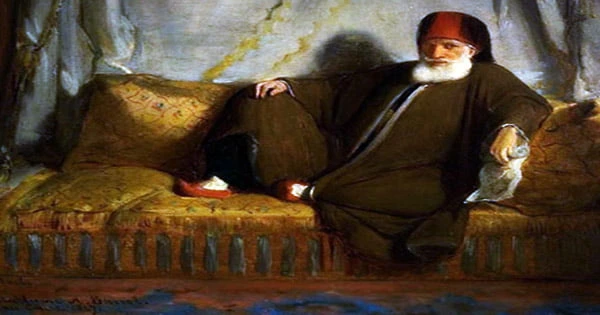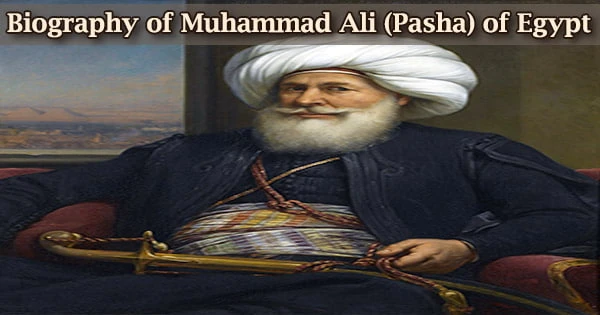Full name: Muhammad Ali Pasha al-Mas’ud ibn Agha
Date of birth: 4th March 1769
Place of birth: Kavala, Sanjak of Kavala, Rumelia Eyalet, Ottoman Empire
Date of death: 2nd August 1849 (aged 80)
Place of death: Ras el-Tin Palace, Alexandria, Egypt Eyalet, Ottoman Empire
Father: Ibrahim Agha
Mother: Zeinab
Religion: Islam
Spouse: Amina Hanim; Mahduran Hanim; Ayn al-Hayat Qadin; Mumtaz Qadin; Mahwish Qadin; Namshaz Qadin; Zayba Khadija Qadin; Shams Safa Qadin; Shami Nur Qadin; Umm Numan; Naila Qadin; Gulfidan Qadin; Qamar Qadin
Children: Ali Sedeek Bek, Fatma Hanem, Hussien Muhammad Ali, Ibrahim Pasha Of Egypt, Ismaeil Kamil Pasha, Muhammad Abdel-Halim, Muhammad Pasha Al-Sagheer, Nazli Hanem, Noman Muhammad Ali, Rokaya Hanem, Sa’id Of Egypt, Tawheda Hanem, Tusun Pasha, Zeinab Hanem
Early Life
Muhammad Ali Pasha al-Mas’ud ibn Agha, generally known as Muhammad Ali of Egypt and Sudan (Ottoman Turkish: محمد علی پاشا المسعود بن آغا; Turkish: Kavalalı Mehmed Ali Paşa; Arabic: محمد علي باشا, ALA-LC: Muḥammad ‘Alī Bāshā; Albanian: Mehmet Ali Pasha; 4 March 1769 – 2 August 1849), was the founder of the dynasty that ruled Egypt from the early nineteenth to the mid-twentieth centuries. From 1805 to 1848, he was the Albanian Ottoman governor and de facto ruler of Egypt. He aided in the formation of the modern Egyptian state.
He ruled over Lower Egypt, Upper Egypt, Sudan, sections of Arabia, and the entire Levant at his peak. Muhammad Ali got into the tobacco business, which allowed him expand his commercial interests in other countries. The Ottoman Empire in Egypt was overrun by French troops under Napoleon Bonaparte in 1798.
Ali arrived in Egypt in 1801 as the second in command of a 300-strong Albanian force tasked with driving the French out. He was a military commander in an Albanian Ottoman force sent to Egypt to reclaim it from Napoleon’s French control. Following Napoleon’s withdrawal, Muhammad Ali rose to power through a series of political maneuvers, and in 1805 he was named Wāli (viceroy) of Egypt and gained the rank of Pasha.
As a result of his rise to power, he was able to depose the Mamluks, the former ruling elite. He made sure that members of the religious elite were turned into government pensioners. Ali put an end to all farmer insurgencies. He was influencing how Egypt rebuilt itself at the time.
In 1831, Muhammad Ali launched war on the Sultan, seizing Syria, reaching into Anatolia, and attacking Constantinople directly, but he was forced to flee by European powers. Following a failed Ottoman invasion of Syria in 1839, Alexander invaded the Ottoman Empire again in 1840, defeating the Ottomans and paving the stage for the conquest of Constantinople.
Faced with another European intervention, he accepted a brokered peace in 1842 and withdrew from the Levant; in return, he and his descendants were granted hereditary rule over Egypt and Sudan. The dynasty he established would rule Egypt until the revolution of 1952 when King Farouk was overthrown by the Free Officers Movement led by Mohamed Naguib and Gamal Abdel Nasser, establishing the Republic of Egypt.

Childhood and Educational Life
Muḥammad ʿAlī’s ethnic background is unknown, though he may have been an Albanian and was certainly a Muslim and an Ottoman subject. He was born at Kavala, a city that’s now in Greece, on 4 March 1769, to an Albanian family, believed to have originated in Korçë. His father, Ibrahim Agha, was a shipping merchant who served as an Ottoman commander in Kavala. Zeynep, his mother, was the daughter of the “Ayan of Kavala” Çorbaci Husain Agha.
He was raised by his uncle and cousins when his father died while he was young. Ali was a hardworking young man who used to work as a tax collector in his hometown. As a result of this, he was promoted to second commander under his relative Sarechesme Halil Agha.
Personal Life
Muhammad Ali married his cousin Amina Hanim, a wealthy widow. She was the daughter of Ali Agha and Kadriye (Zeynep’s sister). He had several consorts, including Amina Hanim, Mahduran Hanim, Ayn al-Hayat Khanum, Mumtaz Qadin, Mahwish Qadin, Namshaz Qadin, and Zayba Khadija Qadin.
He had several children, including Tawhida Hanim, Ibrahim Pasha, Ahmed Tusun Pasha, Isma’il Kamil Pasha, Khadija Nazli Hanim, and Sa’id Pasha.
Working and Political Career
In 1798 Egypt, at that time a semiautonomous province of the Ottoman Empire, was occupied by a French force under Napoleon Bonaparte. Muḥammad ʿAlī arrived there in 1801 as second in command of a 300-man Albanian regiment sent by the Ottoman government to oust the French from Egypt. With great political skill, he managed by 1805 to be named the wālī, the Ottoman sultan’s viceroy in Egypt, with the rank of pasha.

In 1805, a group of prominent Egyptians led by the ulama (scholars, savants) demanded the replacement of Wāli (viceroy) Ahmad Khurshid Pasha by Muhammad Ali, and the Ottomans yielded. In 1809, though, Ali exiled Makram to Damietta. According to Abd al-Rahman al-Jabarti, Makram had discovered Muhammad Ali’s intentions to seize power for himself. The three-year French occupation (1798–1801) had disrupted the country’s traditional political and economic structure.
Continuing the task begun by the French, Muḥammad ʿAlī put an end to Egypt’s traditional society. He eliminated the Mamlūks, the former ruling oligarchy, expropriated the old landholding classes, turned the religious class into pensioners of the government, restricted the activities of the native merchant and artisan groups, neutralized the Bedouins, and crushed all movements of rebellion among the peasants. The task of rebuilding Egypt along modern lines now lay before him.
Due to his military campaigns, Muhammad Ali’s financial requirements also increased greatly. Ali initially supported the Ottoman sultan in bringing down the rebellion in Arabia and Greece. This was followed by his invasion of Nilotic Sudan in search of recruits for his army. Muhammad Ali invited the Mamluk leaders to a celebration at the Cairo Citadel in honour of his son, Tusun Pasha, who was to lead a military expedition into Arabia. The event was held on 1 March 1811.
When the Mamluks had gathered at the Citadel, they were surrounded and killed by Muhammad Ali’s troops. After the leaders were killed, Muhammad Ali dispatched his army throughout Egypt to rout the remainder of the Mamluk forces. Though Muḥammad ʿAlī had considerable native intelligence and great personal charm, he was a man of limited knowledge and narrow horizons. He proved insensitive to the possibilities open to him and governed generally according to Ottoman principles.
No group within Egyptian society was capable of forcing fundamental changes upon him; elements that might have served as the instruments of change had been crushed at the outset of his regime. He was successful in most of his invasions; however, at the Battle of Navarino in 1827, he suffered a major setback and lost his fleet during the European intervention in Greece.
Ali waged a war against the Ottoman sultan around 1831–33 and gained control of Syria all the way to Adana. In July 1840, Great Britain, Russia, Austria, and Prussia colluded to acquire control over Syria, and this made it difficult for Ali to have greater independence in the Ottoman Empire. To strengthen his position within Egypt and to increase his revenues, Muḥammad ʿAlī instituted sweeping changes.
By 1815 most of Egypt’s agricultural land had been converted into state land, and profits from agriculture became available to the ruler. He improved Egypt’s irrigation system, on which its agriculture depended; he introduced new crops, such as cotton, which promised high cash returns; and he reorganized the administrative structure of the government to ensure strict control of the economy.
In addition to bolstering the agricultural sector, Muhammad Ali built an industrial base for Egypt. By the end of the 1830s, Egypt’s war industries had constructed nine 100-gun warships and were turning out 1,600 muskets a month. Disbanding his mercenary army, he created a fleet and an army of Egyptians conscripted from the peasant class but commanded by Turks and others recruited from outside Egypt.
To supply services for his armed forces, he created Western-style schools to train doctors, engineers, veterinarians, and other specialists. He also began sending educational missions to European countries for training in modern techniques. The purpose of the law was to represent Muhammad Ali in his absence. Muhammad Ali started his renovations in law by moving towards a more effective control over crime within Egypt.
His industrial experiments failed, largely because Egypt lacked sources of power, a native managerial class, and a trained working class. Even the agricultural sector declined ultimately because of administrative mismanagement, excessive taxation, military conscription of the peasantry, and his monopolization of trade. Autopsy became an important form of evidence used within criminal law in Egypt, even being used after Muhammad’s reign amongst his successors in the 1850s.
Around 1841, he was granted the hereditary right to rule Egypt and Sudan. However, he did not rule for long after and retired from office in the late 1840s. In the late 1840s, owing to his failing lucidity, Muḥammad ʿAlī retired from office. In 1848, rule was officially transferred to Muḥammad ʿAlī’s son Ibrahim, who died shortly thereafter; Muḥammad ʿAlī himself died in the following year.
During a voyage on his ship, Ibrahim had a severe fever and suffered seizures and hallucinations. He survived the trip, but passed away within six months. He was succeeded by his nephew Abbas I. Although many of his reforms and institutions were abandoned some before his death he is nevertheless hailed as having cleared the path for the creation of an independent Egyptian state.
Death and Legacy
Ali become extremely ill around 1848 and was not even informed of his son’s death. Muhammad Ali died at Ras el-Tin Palace in Alexandria on 2 August 1849, and ultimately was buried in the imposing mosque he had commissioned in the Cairo Citadel. It still remains a landmark in Cairo today and is visited by thousands every year.

The prevailing historical view of Muhammad Ali is as the “Father of Modern Egypt”, being the first ruler since the Ottoman conquest in 1517 to permanently divest the Porte of its power in Egypt. Since his descendants were granted hereditary rule over Egypt and Sudan, they reigned over Egypt until the revolution of 1952.
















